-
ORIGINAL ARTICLE09-20-2024
Risk assessment for postoperative complications in patients undergoing cardiac surgical procedures
Revista Brasileira de Enfermagem. 2024;77(4):e20230127
Abstract
ORIGINAL ARTICLERisk assessment for postoperative complications in patients undergoing cardiac surgical procedures
Revista Brasileira de Enfermagem. 2024;77(4):e20230127
DOI 10.1590/0034-7167-2023-0127
Views0ABSTRACT
Objectives:
to evaluate the risk of postoperative complications in cardiac patients.
Methods:
an evaluative study using the Tuman Score on medical records of 70 adult patients who underwent cardiac surgery at a University Hospital. The R for Windows software was used for the analyses. Descriptive statistics and bivariate analysis were employed to verify the association between the risk score and complications. The relative risk between the Tuman Score and postoperative complications was obtained through Quasi-Poisson regression, with a 95% confidence interval.
Results:
the majority of the patients were male (58.57%), aged between 41-64 years (50%), who underwent myocardial revascularization (50%). These patients were associated with a lower risk of postoperative complications (p=0.003), (p=0.008), and (p=0.000), respectively. High-risk patients had pulmonary complications (RR=1.32, p=0.002) and neurological complications (RR=1.20, p=0.047).
Conclusions:
preoperative risk assessment promotes qualified care to reduce postoperative complications.
Keywords:Cardiac Surgical ProceduresCardiovascular DiseasesCardiovascular NursingPostoperative ComplicationsRisk AssessmentSee more -
EXPERIENCE REPORT09-20-2024
Researchers’ experience in data collection with families of femicide victims
Revista Brasileira de Enfermagem. 2024;77(4):e20230119
Abstract
EXPERIENCE REPORTResearchers’ experience in data collection with families of femicide victims
Revista Brasileira de Enfermagem. 2024;77(4):e20230119
DOI 10.1590/0034-7167-2023-0119
Views0See moreABSTRACT
Objectives:
to describe researchers’ experience in collecting data from families of femicide victims.
Methods:
this descriptive, qualitative study took the form of an experience report and was conducted in Manaus, Amazonas, Brazil. It involved documentary consultation, training researchers, scheduling and conducting interviews, and using a field diary to record the researchers’ perceptions and experiences.
Results:
the descriptions and photographs of the crime scene were both distressing and impactful for the researchers. The mementos of the victims (including clothing, objects, and childhood photos) shown by their families were deeply moving. Identifying with these experiences facilitated listening to the stories told by the relatives. It was essential to maintain a non-judgmental attitude, acknowledge the loss, provide support for the suffering, and demonstrate a willingness to help.
Final Considerations:
the experience encompassed both theoretical and methodological aspects that were planned and executed in data collection, fostering the development of skills and sensitivity towards the cases. Beyond knowledge and preparation, researchers are expected to exhibit ethical conduct and empathetic capacity.
-
ORIGINAL ARTICLE09-20-2024
Factors associated with preventable infant mortality in 2020: a Brazilian population-based study
Revista Brasileira de Enfermagem. 2024;77(4):e20230072
Abstract
ORIGINAL ARTICLEFactors associated with preventable infant mortality in 2020: a Brazilian population-based study
Revista Brasileira de Enfermagem. 2024;77(4):e20230072
DOI 10.1590/0034-7167-2023-0072
Views0ABSTRACT
Objectives:
to identify factors associated with preventable infant deaths, classified as neonatal and post-neonatal.
Methods:
this is an epidemiological and population-based study relating to 2020. Data from the Mortality Information System (MIS) and the preventability classification proposed in the Brazilian Health System List of Causes of Deaths Preventable by Interventions were used.
Results:
prematurity, living in the North and Northeast regions and the occurrence of the event at home were associated with preventable neonatal deaths. To the avoidable post-neonatal component, death outside the hospital, low maternal education and children of brown or yellow color/race were associated.
Conclusions:
the main risk factor associated with preventable deaths was prematurity, in the case of neonatal death. Low maternal education and occurrence outside the hospital were associated with post-neonatal deaths.
Keywords:Epidemiological StudiesHealth Care QualityHealth Information SystemsInfant MortalityVital StatisticsSee more -
EDITORIAL09-09-2024
Potential of Artificial Intelligence in Evidence-Based Practice in Nursing
Revista Brasileira de Enfermagem. 2024;77(5):e770501
Abstract
EDITORIALPotential of Artificial Intelligence in Evidence-Based Practice in Nursing
Revista Brasileira de Enfermagem. 2024;77(5):e770501
DOI 10.1590/0034-7167.2024770501
Views0Evidence-based practice (EBP) has established itself as a fundamental pillar in nursing, driving effective clinical decision-making based on high-quality scientific research. The primary goal of EBP is to ensure that patients receive the most appropriate and safe care, based on the best available evidence. In this context, knowledge synthesis methods are essential tools for EBP, […]See more -
REVIEW09-06-2024
Parents’ or legal guardians’ beliefs and attitudes about childhood vaccination: a scoping review
Revista Brasileira de Enfermagem. 2024;77(4):e20240126
Abstract
REVIEWParents’ or legal guardians’ beliefs and attitudes about childhood vaccination: a scoping review
Revista Brasileira de Enfermagem. 2024;77(4):e20240126
DOI 10.1590/0034-7167-2024-0126
Views0See moreABSTRACT
Objective:
to map scientific evidence about perceptions, beliefs, knowledge and attitudes of parents or legal guardians of children under 5 years of age regarding routine childhood vaccination.
Methods:
a scoping review, conducted in accordance with the JBI framework. The searches were carried out in the PubMed/MEDLINE, Web of Science, Scopus and LILACS databases. A total of 5,535 studies were returned and 77 were selected, which met the inclusion criteria.
Results:
perceptions related to interaction with healthcare professionals and services, with family organization and structure, with social interaction and public policies, cultural, religious and personal beliefs, knowledge about vaccination schedule, vaccination and immunization process and sources of information are the main factors mapped and which can positively or negatively influence parents’ or legal guardians’ attitudes towards vaccinating children.
Conclusions:
the findings allow us to identify factors related to parents’ perception and beliefs about childhood vaccination.
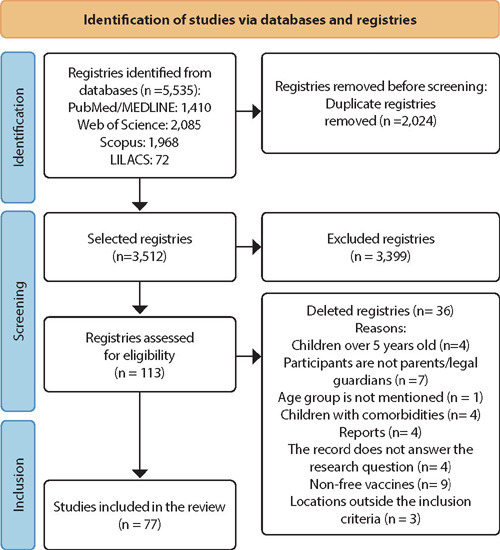
-
ORIGINAL ARTICLE09-06-2024
Construction and validation of an instrument for event-related sterility of processed healthcare products
Revista Brasileira de Enfermagem. 2024;77(4):e20240021
Abstract
ORIGINAL ARTICLEConstruction and validation of an instrument for event-related sterility of processed healthcare products
Revista Brasileira de Enfermagem. 2024;77(4):e20240021
DOI 10.1590/0034-7167-2024-0021
Views0See moreABSTRACT
Objective:
To construct and validate an instrument to assess events related to maintaining the sterility of processed healthcare products.
Methods:
This methodological study developed the instrument through analysis by a panel of experts, focusing on the integrity of commonly used packaging: spunbond-meltblown-spunbond and medical-grade paper. The instrument was analyzed using the Content Validity Index and Content Validity Ratio (≥ 0.80) and modified Kappa (≥ 0.74). The instrument underwent pre-testing.
Results:
Six experienced professionals participated in the expert panel. After two rounds, the final version of the instrument contained five dimensions. In the pre-test, 30 nursing professionals participated, of whom 86.67% considered the instrument good, and 90% found it understandable.
Conclusion:
The construction and validation followed literature recommendations. The instrument is available, aiding in the safe use of processed healthcare products.
-
ORIGINAL ARTICLE09-06-2024
Reflective practice of nurse residents in the teaching-learning process in teaching hospitals
Revista Brasileira de Enfermagem. 2024;77(4):e20230540
Abstract
ORIGINAL ARTICLEReflective practice of nurse residents in the teaching-learning process in teaching hospitals
Revista Brasileira de Enfermagem. 2024;77(4):e20230540
DOI 10.1590/0034-7167-2023-0540
Views0See moreABSTRACT
Objective:
To analyze reflective practice in the teaching-learning process of nurses in residency programs in teaching hospitals in Minas Gerais, Brazil.
Methods:
Case study, based on the reflective practice framework, conducted in two teaching hospitals. Observation and interviews were conducted with first and second-year residents, and five participants were included for in-depth analysis, with their data subjected to frequency distribution analysis and Critical Discourse Analysis.
Results:
In 519 observed activities, elements of reflection were identified in 22.2%, especially active listening and expression of doubts. Discourses indicated practice as the best moment for teaching-learning due to its potential to generate reflections. Learning by doing and case discussion were considered potential strategies for reflective learning.
Conclusion:
Know-in-action reflection was evidenced as the predominant formative aspect for residents, with few opportunities for reflection on reflection-in-action.
-
ORIGINAL ARTICLE09-06-2024
Middle-Range theory of the nursing diagnosis of sedentary lifestyle in young adults
Revista Brasileira de Enfermagem. 2024;77(4):e20230516
Abstract
ORIGINAL ARTICLEMiddle-Range theory of the nursing diagnosis of sedentary lifestyle in young adults
Revista Brasileira de Enfermagem. 2024;77(4):e20230516
DOI 10.1590/0034-7167-2023-0516
Views0See moreABSTRACT
Objective:
To construct a middle-range theory for the nursing diagnosis of Sedentary Lifestyle in young adults.
Methods:
A methodological study for the validation of a nursing diagnosis based on a Middle-Range Theory, carried out in six stages: definition of the approach; definition of theoretical-conceptual models; definition of main concepts; development of a pictorial scheme; construction of propositions; establishment of causal relationships and evidence for practice. The theory construction was operationalized through an integrative review and supported by Roy’s adaptation model.
Results:
Three essential attributes were identified; 10 antecedents; 7 clinical consequences; a pictogram, 9 propositions, and 11 causal relationships and evidence for practice.
Conclusion:
The middle-range theory for the nursing diagnosis of Sedentary Lifestyle in young adults was constructed, expanding the understanding of this phenomenon, to be applied in clinical practice by nurses.

-
REVIEW01-01-2018
Conceptual definitions of indicators for the nursing outcome “Knowledge: Fall Prevention”
Revista Brasileira de Enfermagem. 2018;71(2):431-439
Abstract
REVIEWConceptual definitions of indicators for the nursing outcome “Knowledge: Fall Prevention”
Revista Brasileira de Enfermagem. 2018;71(2):431-439
DOI 10.1590/0034-7167-2016-0686
Views0See moreABSTRACT
Objective:
to construct conceptual definitions for indicators of nursing outcome Knowledge: Fall Prevention, selected for evaluation of hospitalized patients with the nursing diagnosis Risk for falls.
Method:
integrative literature review performed in the LILACS, MEDLINE and Web of Science databases, comprising articles published in English, Spanish and Portuguese languages from 2005 to 2015.
Results:
the final sample of the study was composed of 17 articles. The conceptualizations were constructed for 14 indicators of nursing outcome Knowledge: Fall Prevention focused on hospitalized patients.
Conclusion:
the theoretical support of the Nursing Outcomes Classification (NOC), through the process of constructing the conceptual definitions of the indicators of its results, allows nurses to accurately implement this classification in clinical practice and to evaluate the effectiveness of their interventions through the change of the patients’ status over time.
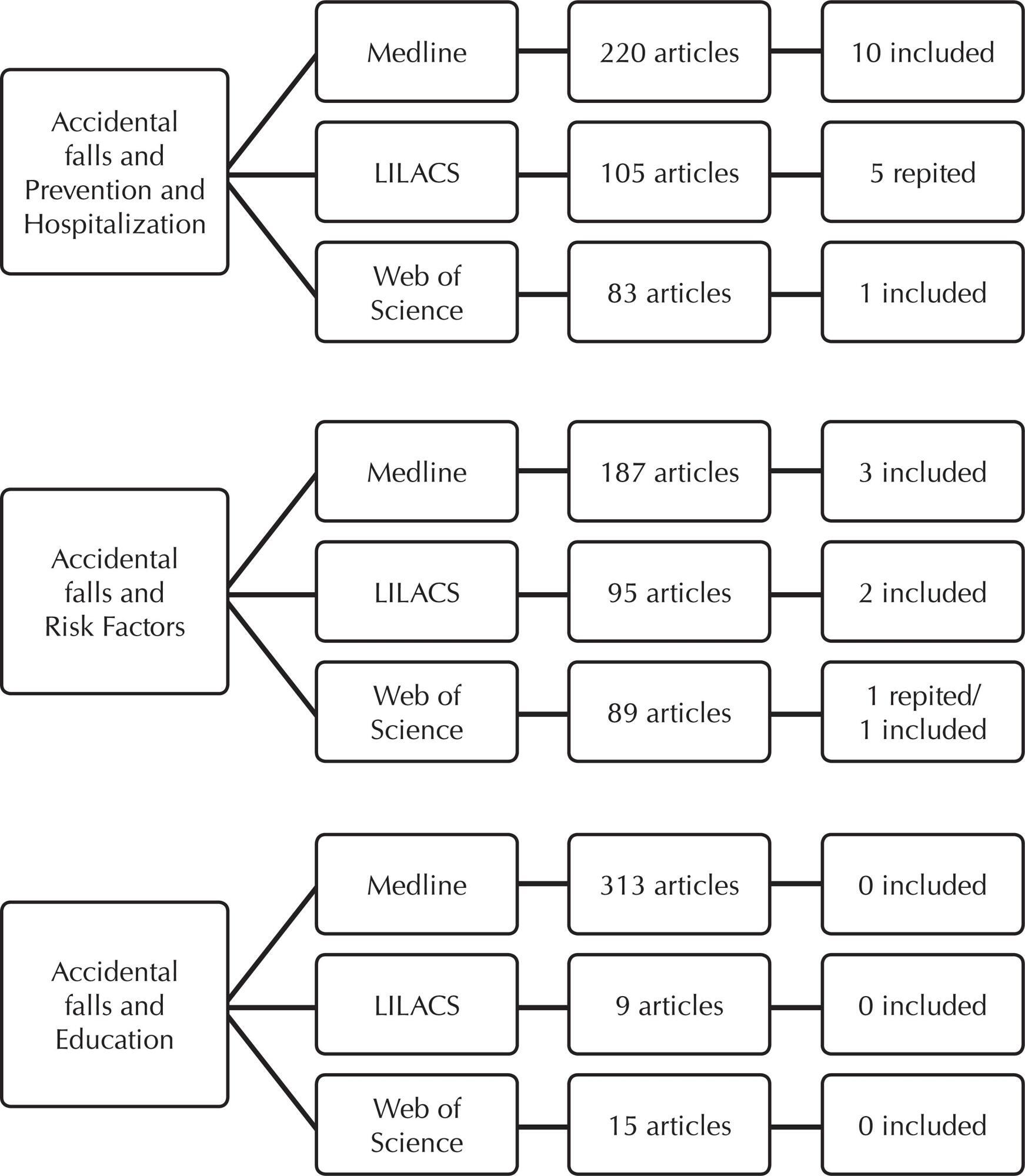
-
REVIEW01-01-2018
Integrative literature review: sleep patterns in infants attending nurseries
Revista Brasileira de Enfermagem. 2018;71(2):424-430
Abstract
REVIEWIntegrative literature review: sleep patterns in infants attending nurseries
Revista Brasileira de Enfermagem. 2018;71(2):424-430
DOI 10.1590/0034-7167-2016-0480
Views0See moreABSTRACT
Objective:
To identify evidence available in the literature about sleep patterns of infants attending nurseries.
Method:
An integrative review of studies published in Portuguese, English or Spanish available in full text on LILACS, CINAHL, and PubMed databases. The following descriptors sono, lactente and creches or berçários (in Portuguese) and sleep, infant and childcare or nurseries were used for LILACS, CINAHL and Pubmed, respectively. Nine studies were selected and analyzed.
Results:
The main component explored in the studies about sleep pattern is the sleep position of the infants, due to its association with sudden infant death syndrome. The results pointed to the need to promote and develop written guidelines regarding behavioral practices to reduce the risk of this phenomenon.
Conclusion:
Evidence has identified sleep issues, mainly regarding the sleep position of the infant and the environment where the infant sleeps, showing that it is critical to set routines and interventions to improve the quality of sleep care of infants attending nurseries.
-
REVIEW01-01-2018
The nurses’ work process in different countries: an integrative review
Revista Brasileira de Enfermagem. 2018;71(2):413-423
Abstract
REVIEWThe nurses’ work process in different countries: an integrative review
Revista Brasileira de Enfermagem. 2018;71(2):413-423
DOI 10.1590/0034-7167-2016-0468
Views0See moreABSTRACT
Objective:
To analyze the characteristics of nurses’ work process in different countries.
Method:
We have used the integrative review method and selected 84 publications (articles, theses and dissertations) in national and foreign thesis banks and databases. We analyzed the evidence based on dialectical materialism.
Results:
The rejection of managerial tasks hides the singularity of nurses’ work, due to the failure to understand the inseparable nature of managerial and healthcare tasks, given that it is what provides the expertise to coordinate the nursing work process and guide the healthcare work processes. The social and technical division is present in the work process in all countries studied, albeit in different ways. The nurse’s position in the healthcare work process is subordinated to that of the physician.
Conclusion:
The characteristics are similar. The rejection of the dual nature of the work by nurses themselves due to alienation results in the non-recognition of their own work.
-
RESEARCH01-01-2018
Validation and reliability of the scale Self-efficacy and their child’s level of asthma control
Revista Brasileira de Enfermagem. 2018;71(2):406-412
Abstract
RESEARCHValidation and reliability of the scale Self-efficacy and their child’s level of asthma control
Revista Brasileira de Enfermagem. 2018;71(2):406-412
DOI 10.1590/0034-7167-2016-0528
Views0See moreABSTRACT
Objective:
To evaluate the psychometric properties in terms of validity and reliability of the scale Self-efficacy and their child’s level of asthma control: Brazilian version.
Method:
Methodological study in which 216 parents/guardians of children with asthma participated. A construct validation (factor analysis and test of hypothesis by comparison of contrasted groups) and an analysis of reliability in terms of homogeneity (Cronbach’s alpha) and stability (test-retest) were carried out.
Results:
Exploratory factor analysis proved suitable for the Brazilian version of the scale (Kaiser-Meyer-Olkim index of 0.879 and Bartlett’s sphericity with p < 0.001). The correlation matrix in factor analysis suggested the removal of item 7 from the scale. Cronbach's alpha of the final scale, with 16 items, was 0.92.
Conclusion:
The Brazilian version of Self-efficacy and their child’s level of asthma control presented psychometric properties that confirmed its validity and reliability.
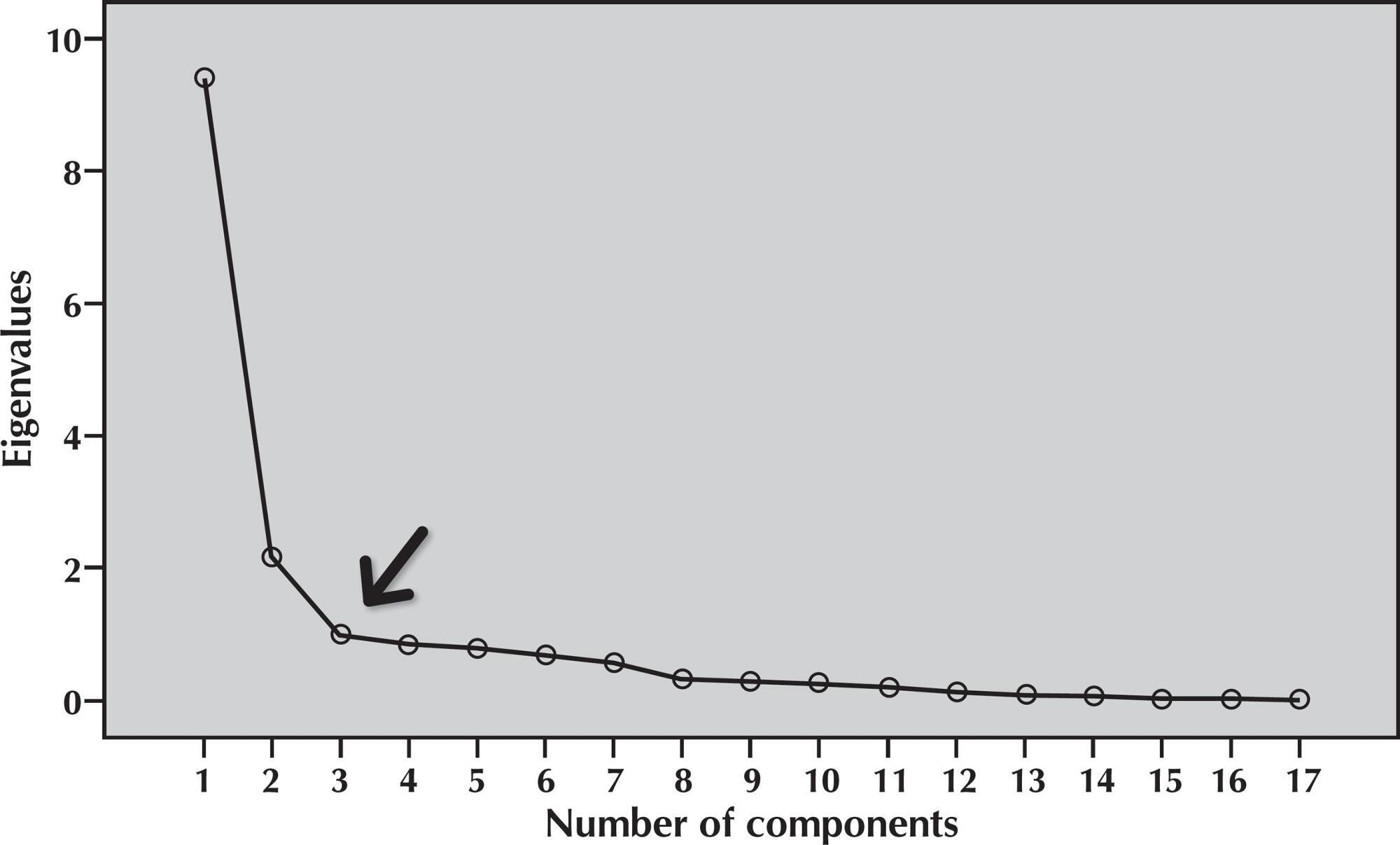
-
RESEARCH01-01-2018
Spiritual well-being and hope in the preoperative period of cardiac surgery
Revista Brasileira de Enfermagem. 2018;71(2):398-405
Abstract
RESEARCHSpiritual well-being and hope in the preoperative period of cardiac surgery
Revista Brasileira de Enfermagem. 2018;71(2):398-405
DOI 10.1590/0034-7167-2016-0642
Views0ABSTRACT
Objective:
To characterize relations between spiritual well-being and hope of patients in the preoperative period of cardiac surgery.
Method:
Exploratory cross-sectional study with quantitative approach, performed in the infirmaries of a reference hospital in cardiology. We evaluated 69 patients hospitalized in preoperative period of myocardial revascularization, valve repair or replacement.
Results:
We verified that patients hold relevant scores of hope and welfare in all areas, being the existential well-being significantly lower than the religious one. The average of the spiritual well-being score was below the required to be considered high. There was no significant correlation between welfare and hope.
Conclusion:
Nurses should develop a watchful eye to these issues, be trained in specific protocols of spiritual anamnese and use the real moments of care to strengthen the patients.
Keywords:Cardiac SurgeryMyocardial RevascularizationPreoperative PeriodPsychological AdaptationSpiritualitySee more -
RESEARCH01-01-2018
Body consciousness of people with intestinal stomach: A phenomenological study
Revista Brasileira de Enfermagem. 2018;71(2):391-397
Abstract
RESEARCHBody consciousness of people with intestinal stomach: A phenomenological study
Revista Brasileira de Enfermagem. 2018;71(2):391-397
DOI 10.1590/0034-7167-2016-0666
Views0See moreABSTRACT
Objective:
to describe the bodily awareness of people with stomies.
Method:
a descriptive study with a qualitative approach, carried out in the Ostomized Association of the State of Ceará, through semi-structured interviews with ten people with intestinal stomies, according to Merleau-Ponty’s phenomenological thinking.
Results:
two categories of analysis emerged: The body that I have, in which the sensations of deficiency, imperfection and bad odor add to the feeling of strangeness towards one’s own body, affecting the way of being in the world of each deponent; and The body that others perceive, in which the stoma is seen as an embarrassing and complex experience, since it hampers daily activities and conviviality with other people.
Final considerations:
The corporeal consciousness of Being-Stomp-in-the-world requires the movement to reconstruct the senses of the body from the body I have and from that which others perceive.
-
RESEARCH01-01-2018
Construction and validation of forms: systematization of the care of people under hemodialysis
Revista Brasileira de Enfermagem. 2018;71(2):379-390
Abstract
RESEARCHConstruction and validation of forms: systematization of the care of people under hemodialysis
Revista Brasileira de Enfermagem. 2018;71(2):379-390
DOI 10.1590/0034-7167-2015-0130
Views0See moreABSTRACT
Objective:
create and validate forms to subsidize the systematization of nursing care with people on hemodialysis.
Method:
institutional case study to support the systematization of assistance from the construction of forms for data collection, diagnoses, interventions and nursing results, using cross-mapping, Risner’s reasoning, Neuman’s theory, taxonomies of diagnoses, interventions and nursing results with application in clinical practice and validation by focal group with specialist nurses.
Results:
18 people on hemodialysis and 7 nurses participated. Consensus content of form matter with specialist nurses in the area (Crombach 0.86). The papers captured 43 diagnoses, 26 interventions and 78 nursing results depicting human responses in their singularities.
Final considerations:
the validated forms fill a gap by enabling the capture of human responses from people on hemodialysis and by subsidizing the planning of nursing care on a scientific basis.
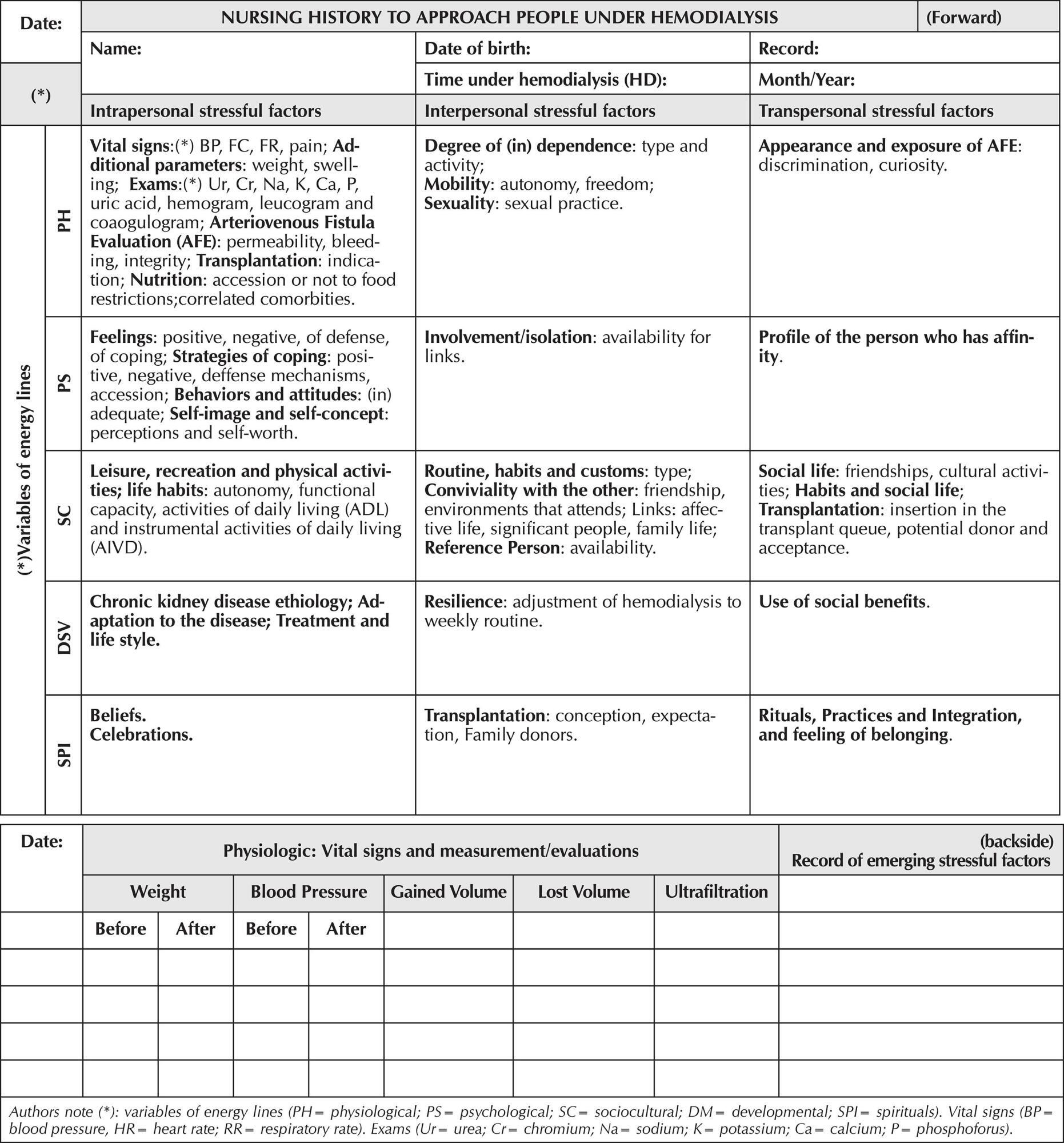
-
RESEARCH01-01-2018
Perception of nursing workers humanization under intensive therapy
Revista Brasileira de Enfermagem. 2018;71(2):372-378
Abstract
RESEARCHPerception of nursing workers humanization under intensive therapy
Revista Brasileira de Enfermagem. 2018;71(2):372-378
DOI 10.1590/0034-7167-2016-0485
Views0ABSTRACT
Objective:
understand the perception of nursing workers working in the Intensive Care Unit (ICU) regarding humanization in the work environment.
Method:
we used the reference of phenomenology, structure of the phenomenon. Participated 25 nursing professionals working in an adult ICU of a university hospital, through focused interviews, answering the guiding question: What do you understand by humanization of the working conditions of the nursing team working in the ICU?
Results:
the analysis revealed the themes: humanization in the ICU; working condition in the ICU; management of people in the ICU and management process in the ICU.
Final considerations:
humanization is necessary through the change of the work environment and the managerial process, privileging the participatory management model as a way to transform theory into practice and value the worker.
Keywords:Health PersonnelHumanization of CareIntensive Care UnitParticipative ManagementQualitative ResearchSee more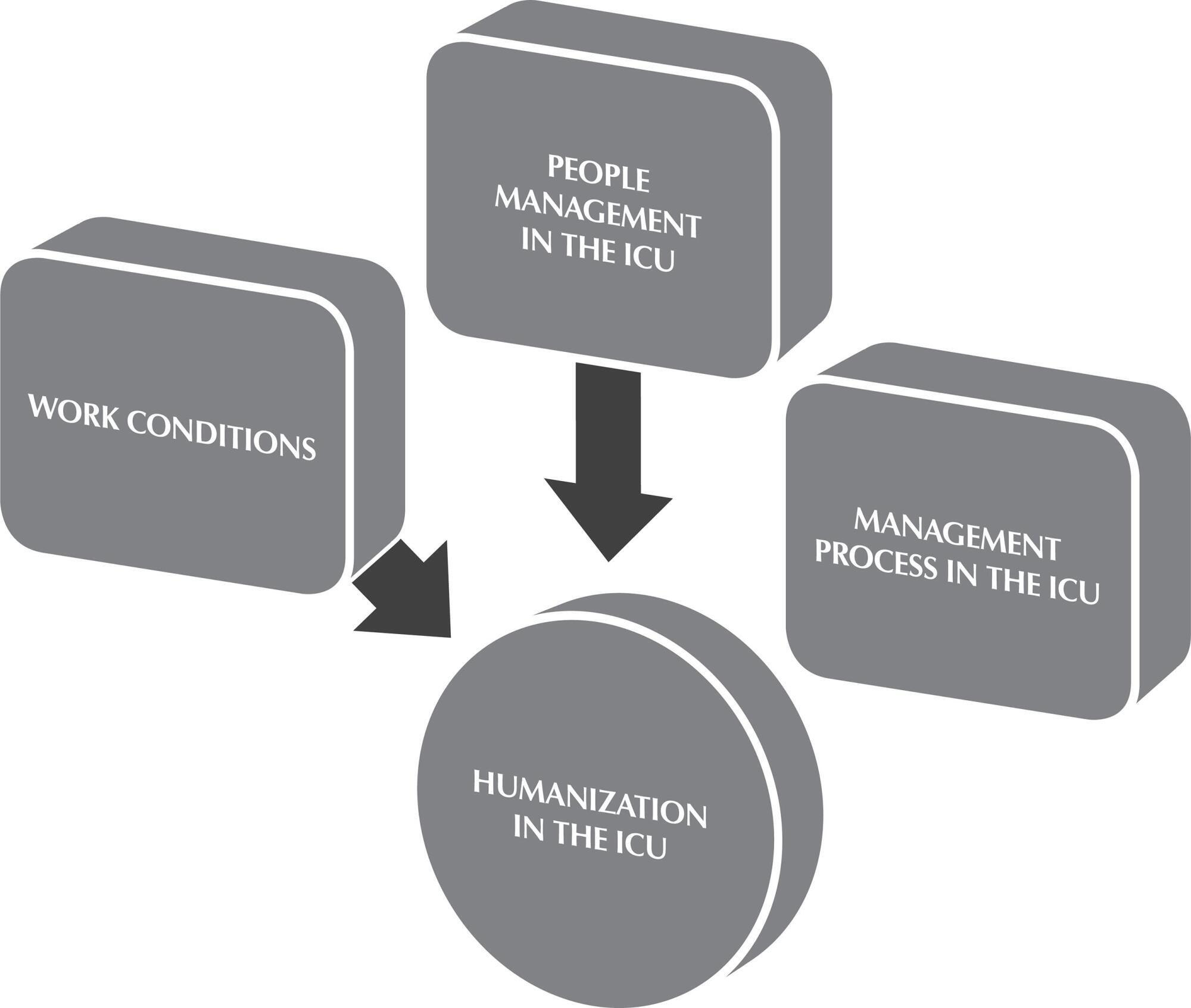
-
Quality of life and physical activity in intensive care professionals from middle São Francisco
Revista Brasileira de Enfermagem. 2015;68(1):26-31
Abstract
Quality of life and physical activity in intensive care professionals from middle São Francisco
Revista Brasileira de Enfermagem. 2015;68(1):26-31
DOI 10.1590/0034-7167.2015680104i
Views0Objective:
the objective was to assess the level of physical activity (LPA) and the quality of life QL of the professionals who work in ICU.
Method:
this was a cross-sectional study carried out in Adult ICUs. LPA was assessed by the International Questionnarie of Physical Activity – short form (IQPA-SF) and the QL by the Medical Outcomes Study 36 (SF-36) questionnaire.
Results:
it was classified active 50.89% out of a total of 59 professionals. Nursing technicians were considered the most active with 60.6%. The QL of the professionals who were considered active were better when compared to inactives, with statistical differences to the category of physical aspects limitation, social aspects and mental health. The working hours were higher than recommend, the physicians were higher than the physical therapist, nurses and technicians nurses (p = 0.046).
Conclusion:
physically active professionals who work in ICU had higher quality of life probably why have lower hours of work and consequently more free time to engage in physical activity.
Keywords:Burnout ProfessionalHumanization of Hospital ServicesIntensive Care UnitPhisycal ActivityQuality of LifeSedentary LifestyleSee more
-
Learning needs of Nursing students in technical vocational education
Revista Brasileira de Enfermagem. 2015;68(1):20-25
Abstract
Learning needs of Nursing students in technical vocational education
Revista Brasileira de Enfermagem. 2015;68(1):20-25
DOI 10.1590/0034-7167.2015680103i
Views0See moreObjective:
identify learning needs of students of Technical Vocational Education (TVE) in Nursing. Qualitative study conducted in a city of São Paulo state.
Method:
the subjects were students, teachers and coordinators of TVE and students of the bachelor degree who have had contact with TVE. Data collection was performed by questionnaire socioeconomic and cultural circles about the learning needs. For data analysis we used the content analysis.
Results:
it was found that students have difficulties contents not related to nursing as portuguese and mathematics, as well as introductory courses in the course of TVE which possibly may interfere negatively in learning specific content of nursing and the quality of health care.
Conclusion:
it is necessary to rethink the content taught and ways to teach from basic education, as well as the training of teachers who now works in the TVE.
-
Serious game e-Baby: nursing students’ perception on learning about preterm newborn clinical assessment
Revista Brasileira de Enfermagem. 2015;68(1):13-19
Abstract
Serious game e-Baby: nursing students’ perception on learning about preterm newborn clinical assessment
Revista Brasileira de Enfermagem. 2015;68(1):13-19
DOI 10.1590/0034-7167.2015680102i
Views0See moreObjective:
to evaluate students opinion regarding e-Baby educational technology.
Methodology:
exploratory descriptive study in which participated a sample composed of 14 nursing Portuguese students that used e-Baby digital educational technology in an extracurricular course. To achieve the aim of the study, the data collection was realized through an opinion instrument in Likert scale including the possibility of commentaries by students. Is was also collected data of participants’ characterization.
Results:
students made very satisfactory evaluations regarding the game e-Baby, varying since usability acceptation through suggestions of expansion of the game to other nursing themes.
Conclusion:
serious game e-Baby can be considered a didactic innovation and motivator tool of learning. Besides, it demonstrates have adequate interface in design and educative function aspects, evocating intense interaction between user and computational tool.

-
EDITORIAL01-01-2015
Challenges beyond the scientific knowledge production
Revista Brasileira de Enfermagem. 2015;68(1):7-8
Abstract
EDITORIALChallenges beyond the scientific knowledge production
Revista Brasileira de Enfermagem. 2015;68(1):7-8
DOI 10.1590/0034-7167.2015680101p
Views0For several decades, innumerous appeals and reflections on how to build the nursing science and achieve visibility in the scientific world led researchers to make efforts to produce knowledge that contributed to the well-being of people, improving their quality of life, relieving their suffering and transforming the reality in which we live. In addition to […]See more
Search
Search in:
Nuvem de Tags
Aged (144) Atenção Primária à Saúde (239) COVID-19 (104) Cuidados de Enfermagem (269) Educação em Enfermagem (151) Educação em Saúde (139) Enfermagem (930) Estudos de Validação (131) Health Education (144) Idoso (208) Mental Health (149) Nursing (987) Nursing Care (306) Patient Safety (151) Primary Health Care (284) Qualidade de Vida (104) Quality of Life (106) Saúde Mental (145) Segurança do Paciente (150) Validation Studies (108)



